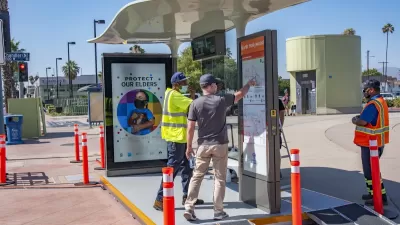Many U.S. transit agencies have policies allowing riders to request dropoffs between stops, but fail to publicize them to passengers and operators.

If you’ve ever wished you could ask your bus driver to let you off between stops, it turns out you probably can. According to an article in Next City by H. Jiahong Pan, many U.S. transit agencies have a “request stops” policy that allows riders to ask to disembark between designated stops “within reason.” Request stops can make travel safer and more accessible by letting people exit the bus closer to their destination or in places with better lighting or pedestrian infrastructure.
However, few riders, or even drivers, know about the policies, even though some date back as far as the early 1970s. “Although studies have shown the policy helps female riders who feel uncomfortable walking long distances at night alone, transit agencies struggle to get the word out and develop clear, consistent policies.”
While agencies are working to clarify these policies for operators and riders, some also ban request stops on rapid transit lines, saying that adding stops would increase travel times. Agencies also have a variety of rules for where drivers can drop off passengers, such as only stopping at corners before an intersection or banning dropoffs next to highways.
FULL STORY: An Obscure Rule About Bus Stops Can Make Riding At Night Safer

Alabama: Trump Terminates Settlements for Black Communities Harmed By Raw Sewage
Trump deemed the landmark civil rights agreement “illegal DEI and environmental justice policy.”

Planetizen Federal Action Tracker
A weekly monitor of how Trump’s orders and actions are impacting planners and planning in America.

How Atlanta Built 7,000 Housing Units in 3 Years
The city’s comprehensive, neighborhood-focused housing strategy focuses on identifying properties and land that can be repurposed for housing and encouraging development in underserved neighborhoods.

In Both Crashes and Crime, Public Transportation is Far Safer than Driving
Contrary to popular assumptions, public transportation has far lower crash and crime rates than automobile travel. For safer communities, improve and encourage transit travel.

Report: Zoning Reforms Should Complement Nashville’s Ambitious Transit Plan
Without reform, restrictive zoning codes will limit the impact of the city’s planned transit expansion and could exclude some of the residents who depend on transit the most.

Judge Orders Release of Frozen IRA, IIJA Funding
The decision is a victory for environmental groups who charged that freezing funds for critical infrastructure and disaster response programs caused “real and irreparable harm” to communities.
Urban Design for Planners 1: Software Tools
This six-course series explores essential urban design concepts using open source software and equips planners with the tools they need to participate fully in the urban design process.
Planning for Universal Design
Learn the tools for implementing Universal Design in planning regulations.
Caltrans
Smith Gee Studio
Institute for Housing and Urban Development Studies (IHS)
City of Grandview
Harvard GSD Executive Education
Toledo-Lucas County Plan Commissions
Salt Lake City
NYU Wagner Graduate School of Public Service





























